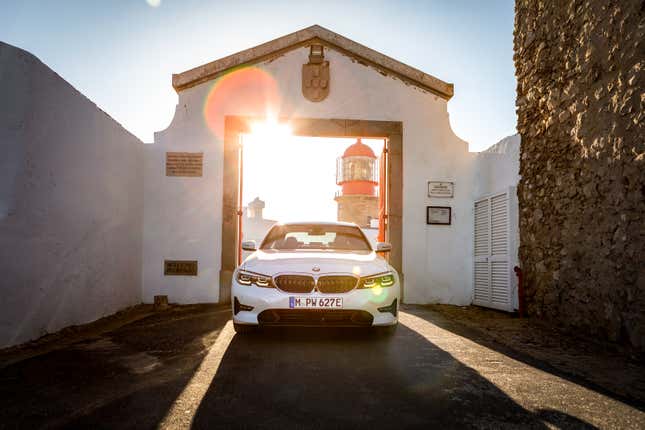Full disclosure: I’ve never been hugely impressed by any of the hybrids I’ve driven. I like my cars sporty, with power outputs that should make you question their legality. Neither of those characteristics have been typically found in any hybrid I have driven. I figured, then, perhaps I’m not the right guy for BMW to ask to come to Munich and test the new 2020 BMW 330e plug-in hybrid.
Granted, my hybrid experience has been limited to a first-generation Prius rental car that I was stuck with for a few weeks. And at the other end of the spectrum, there was the Porsche Panamera 4 E-Hybrid I drove when it debuted in South Africa. Neither one of these cars did much to impress me, the Prius because it was too slow and the Panamera because it was too heavy. On the latter, the additional weight from the battery couldn’t make up for the boost in power.
If Porsche can’t get its hybrid tech from the epic 918 adapted to work well in a road car, I figured: What hope does BMW have?
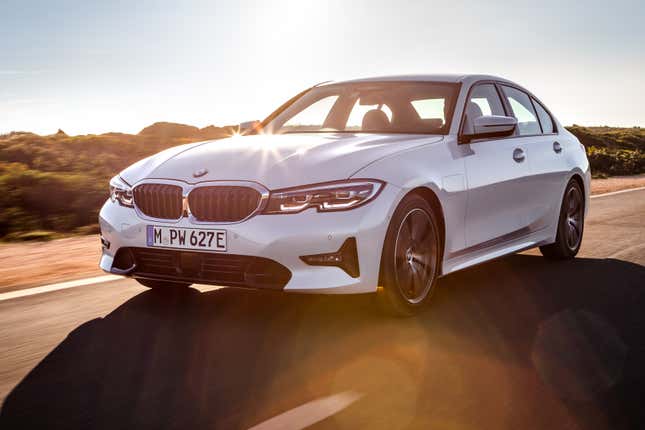
Well, after driving the new hybrid 3 Series, I found it to be more than quick enough, and packed with enough truly interesting technology that it doesn’t feel like just some compliance car. It stands on its own, and fills the gap between the standard four-cylinder 3 and the bigger six-cylinder one.
(More Full Disclosure: BMW invited me to Germany during the hottest week ever recorded in the country’s history and put me up at a lovely hotel whose track record for functioning A/C was spotty at best. But they did take us to a lovely Bavarian beer garden. Its amazing what a few liters of German beer will do to fix your troubles.)
Well to start, this isn’t BMW’s first go at a 3 Series hybrid. Way back in 2017 BMW introduced us to the first 330e plug-in hybrid which we tested and found did not suck. It was expensive and heavy, we decreed, but drove enough like a proper 3 Series that it proved enthusiasts don’t need to fear hybrid cars.
And BMW has clearly seen the future and realizes that future is electrified. In chatting with the assembled execs at BMWs Munich HQ, they see their market for EVs growing by 30 percent annually until at least 2025. At that rate, they figure, EVs will constitute a major part of BMW’s annual sales within the next decade. That’s a number too large to ignore. Certainly it’s enough to commit some real R&D dollars to.
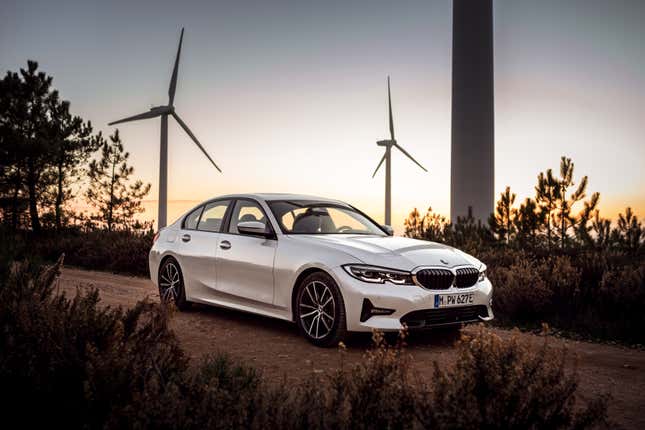
This strategy hasn’t been without some controversy. BMW’s CEO recently announced he was leaving, early, amid criticisms the company was moving too slowly on electrification after scoring an early lead with the i3 and i8. And some have raised eyebrows about BMW’s platform strategy—one that will accommodate EVs, hybrids and conventional cars on the same architecture, not a dedicated one for electrics.
But it’s a strategy BMW is sticking with, and it’s a commitment that definitely shows through in the 330e, the hybridized version of the latest 3 Series that rides on this all-new flexible, modular platform.
(Oh, and there’s a Touring wagon version of the 330e hybrid too, but it’s not coming stateside. These things aren’t up to me.)
Specs That Matter
The 330e sports a 2.0-liter gasoline-powered inline-four with BMW Twin Power Turbo technology that puts out 184 horsepower. (To be clear, Twin Power Turbo does not mean two turbos. It actually means a single, twin scroll turbo. Makes sense, right?) On the electric side of things, you get a single motor placed between the engine and eight-speed automatic transmission that makes a peak of 113 HP.
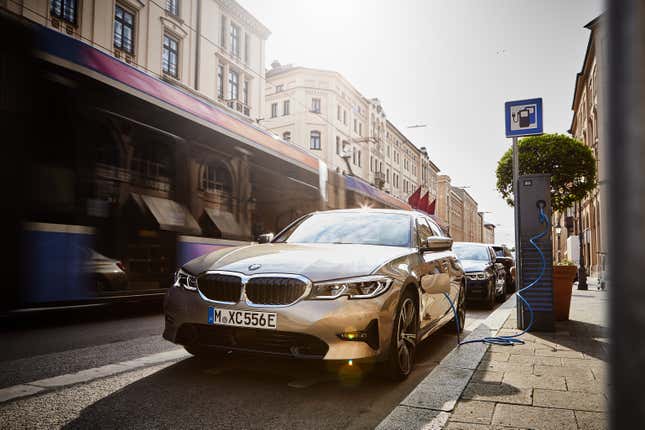
Combined, they make 252 HP and 310 lb-ft of torque, which compares very well to its fully gas powered sibling the 330i. That car puts out 255 HP and 295 lb-ft of torque.
But since BMW is still a performance-minded company, it’s added a mode called XtraBoost. Now while there may be several BMW marketing guys looking for employment after coming up with that name (I personally had my money on Sporty Dynamism+), XtraBoost itself is actually a very awesome feature.
2BMW claims that with the XtraBoost activated the hybrid will do 0-60 in 5.9 seconds (which I felt was incredibly underrated) with a top speed of 143 mph.
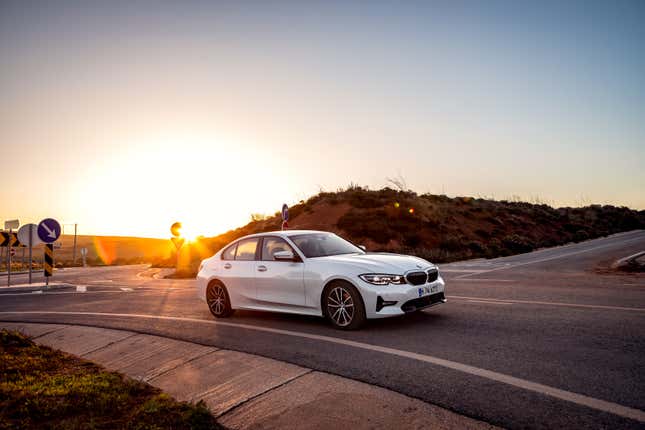
The 330e can also function with just the electric motor doing all the work. In full Electric Mode the car hits Vmax at 87 mph. (That’s 19 mph more than the last gen car.) BMW claims that the 330e can go a full 30 miles on electric power alone in U.S. spec, which is also more then double what the last-gen car did—you only got a paltry 14 electric miles from that car. With that increase in range, the electric powertrain has become vastly more useful. The idea is a large portion of commuters can easily do their daily commute on battery power alone, and since BMW’s electrification plan seems especially aimed at city dwellers, this makes a lot of sense.
Power for the electric motor comes from a 12 kWh, 354 volt Lithium-ion battery tucked under the rear seats. The fuel tank, which normally resides in this space, has been relocated to under the trunk. This slightly reduces the available space back there from 13.8 cubic feet in the 330i to 13.2 cubic feet in the 330e. U.S. fuel economy specs haven’t been released, but this 330e is said to have 15 percent better fuel economy than its predecessor.
The one other drawback to the hybrid is weight. Now fortunately it isn’t as prevalent as it was in the Porsche Panamera but the 330e still outweighs its sibling by a not insubstantial 247 pounds, tipping the scales at a beefy 3,836 pounds. (Recharging that heavy battery to 80 percent takes a little under 2.5 hours, BMW says.)
The 330e also has various driving modes to make use of the hybrid, electric-only and Sport functions. To further the efficiency of the car during real world use, BMW has developed a feature called Intelligent Deceleration with Adaptive Recuperation. This software tells the car whether to coast or use regenerative braking to put power back into the battery pack when approaching stopped traffic or intersections and the like. Additionally there’s a Battery Control Mode, which allows the driver to keep the battery charged at a selected level so that battery power can be saved for when it’s needed, like driving in emission-free city centers or wherever.
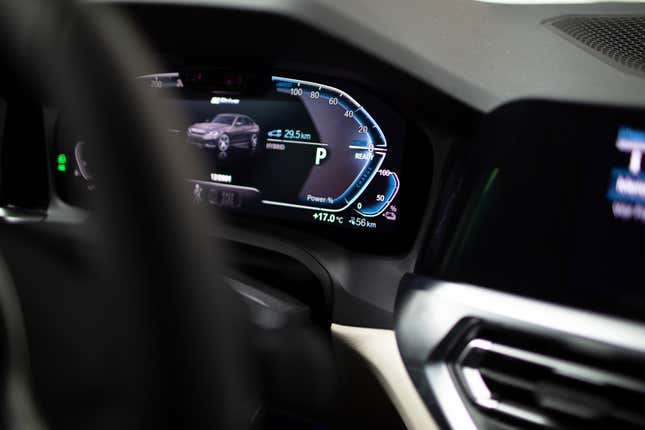
That’s a cool feature we should definitely talk about—the 330e makes use of geofencing to potentially put it in EV-only mode in certain places. With many city centers around the globe starting to tax (or outright ban) emissions-producing vehicles, the 330e uses GPS data to detect these low emission zones and automatically switch to electric power with the “eDrive Zones” mode. This useful function will be standard equipment for all BMW plug-in hybrid models from 2020 on. It’s a clever feature, and I’m eager to see how it performs in the real world.
On The Inside
The interior is all 3 Series, with very few differences between the 330e and its non-hybrid siblings. This is a very good thing. I think with the seventh-generation 3 Series cabin, BMW is finally back in proper form. The interior space feels very modern and sleek without feeling cold.
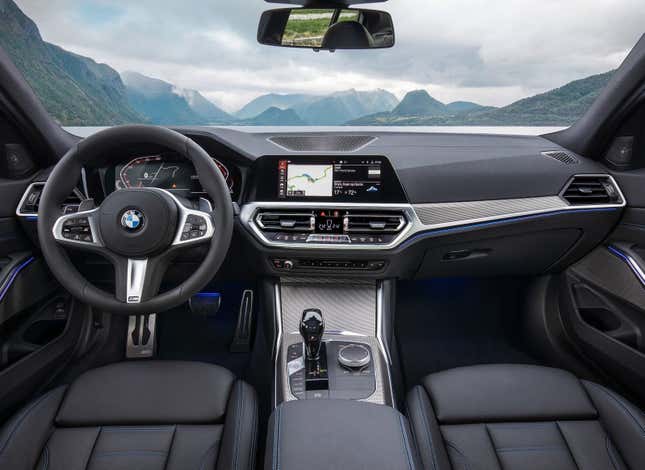
There’s also the a digital display which I first experienced in the 8 Series and Z4 last year. It’s stylish, but also very informative and easy to read at the same time. Continuing the digital theme, the center dash is dominated by a a high-definition touch screen similar in function to the Mini JCW Clubman that I drove on this same trip. I loved it in the Mini and I love it here. It’s basically my new standard by which all other in-car displays have to measure up to.
Another cool (literally) feature that BMW has baked into the 330e is a pre-cool/ pre-heat function. Accessing the energy stored in the battery, the 330e is able to adjust the temperature in the car prior to its occupants’ arrival, cooling it in warmer conditions and heating it in cooler ones. All without starting up the CO2 emitting gas engine.

The 330e can tick the boxes of virtually all of the same options and packages available on the rest of the 3 series line. The Advantage, Sport Line, Luxury Line or M Sport packages are all available here. Going a step further the 330e can be even be ordered with performance features such as Adaptive M suspension and M Sport brakes. Do I get the sense BMW’s mad that the not-at-all-slow Tesla Model 3 is stealing some of its sales? Of course I do. This almost feels like its way of firing back.
On The Road
As good as the 330e sounds on paper, it’s the driving experience that has always let me down on hybrids. And that’s supposed to be what BMWs are best at, so I didn’t know what to think going in. However, on a combination of lovely German B roads and unrestricted Autobahn, the 330e proved it had earned the right to wear the roundel badge on the hood.
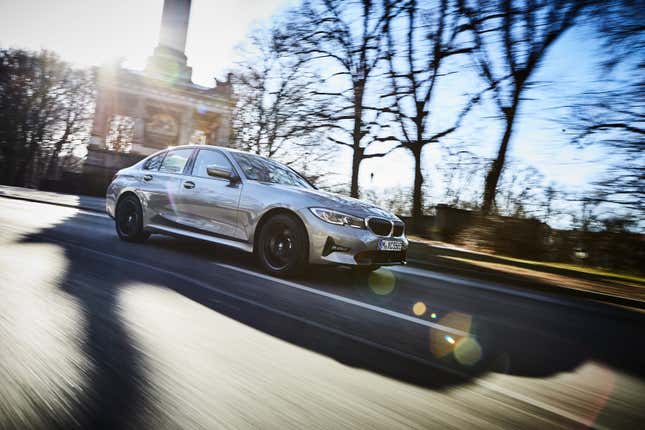
The first thing I noticed leaving BMW’s Munich facility was that acceleration from a stop in both hybrid and full electric mode was brisk. Not M3 brisk—they’re not there yet—but enough that this hybrid will surprise some folks during the daily stoplight drag pulls. I played around with the various hybrid modes but finally settled on the sport mode (shocker) which gave me constant access to XtraBoost, as well as the quicker throttle response.
Now that I had all 292 HP and a bunch of torque on tap, I was able to push the 330e hard on the twisty test route that BMW had programed into our navigation. With basically the same suspension as the 330i the hybrid took to the curves like a 3 Series should. It proved super confident and stable through the fast stuff and responsive through some of the higher hairpins.
When I was pushing the car in sport mode. the 330e didn’t feel like a BMW hybrid, it felt like, well… just a BMW. In fact it felt like a BMW with a much bigger motor under the hood. Tight corner coming up? No need to downshift just use the grunt from the electric motor to pull you through. Neat trick, that.
Honestly he only thing differentiating the 330e from the 330i is the extra weight that the hybrid carries. It’s not debilitating like on the Panamera, but it is noticeable and becomes more so the harder you push the car.
Also, the Pirelli P7 Cinturato tires fitted to our car weren’t doing the 330e any favors. Pirelli makes a number of great tires. The P7s are not any of them. The lack of grip from the P7s made the extra weight of the 330e even more noticeable, especially when having to change direction rapidly. Stickier, better rubber would help put the handling performance of this car much closer to the 330i.
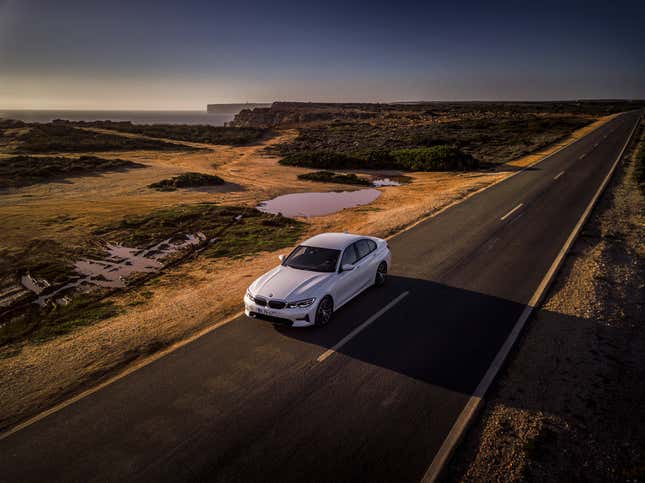
One of the things that stood out to me during the several hours I spent tooling around in the 330e was how integrated everything felt. In other hybrids you can really notice when the gas motor comes on line or the clunky feeling of the brakes when you’re running a high level of regen. It’s like the systems are all doing their own thing. But the 330e felt properly sorted with everything working in harmony. Just like you’d expect a BMW hybrid to feel.
Early Verdict
The 330e is already a solid win in my book, and an objectively huge leap over its predecessor.
The one thing I will take BMW to task for is that I think they have marketed the car the wrong way. For years, hybrid meant Prius. It meant that you were a tree hugging, save-the-planet, bleeding heart eco-warrior. But in order to be that person you were willing to give up any sort of joy in driving, as the Prius is basically just an eco people mover. On the more extreme end of things, you have the Porsche 918 or even the Acura NSX, but those are hardly accessible to ordinary people. (There was also the first hybrid Honda Accord. It was the most powerful Accord at the time, with a reasonably hi-po V6, but nobody knew why it existed, and it was cancelled after a few short years.)
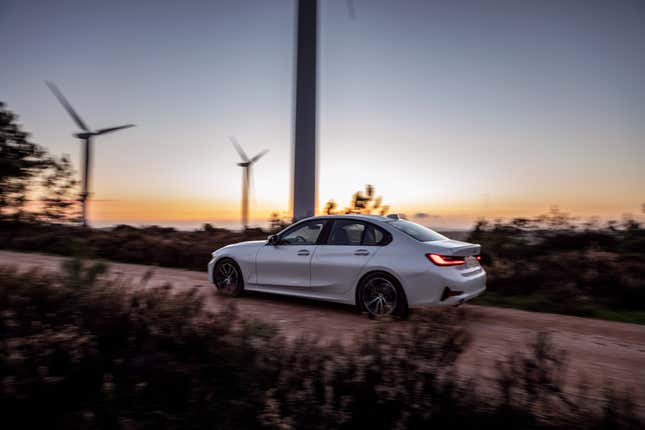
Sure, the 330e is eco-friendly. In fact it’s so eco-friendly that when BMW did a CO2 study for 330e which compared everything from materials and production all the way through the lifespan of the car and recycling of parts, it found that the CO2 produced by the 330e over its life was 20 percent less than its gas power sibling when using a standard energy supply and as much as 60 percent less when using a “green” energy supply.
That being said the 2020 330e shouldn’t be marketed as some sort of save-the-planet hybrid. It should be marketed as a 34oi-lite that just happens to get really, really good fuel economy or helps European buyers get around heavier carbon taxes.
Still, having the XtraBoost mode makes this car more than competitive performance-wise with the 340i and when it hits the market next year as a 2021 model, it should be priced several thousand less than it as well. (U.S. pricing has not been announced as of this writing.)
I semi tongue-in-cheek made the comment to one of the BMW engineers that their hybrid system was so effective with boosting performance that they should equip it on all the new M cars. He gave me a big wink and said “Yes, yes we should do that…”
If the 330e Plug-In Hybrid is the start of BMW’s hybrid strategy, then I can’t wait to see what’s coming next.
